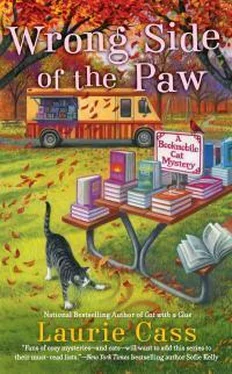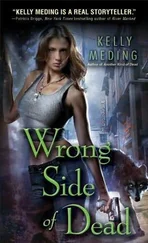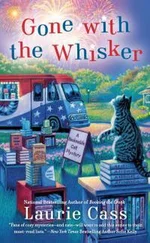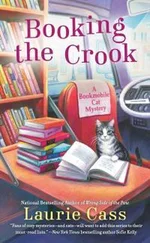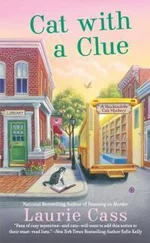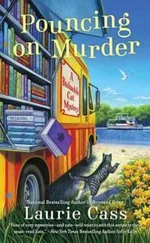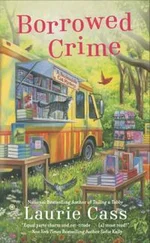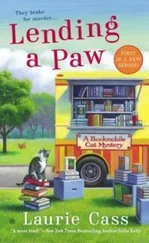Mitchell gave me a disbelieving stare. “With puzzles?”
“Um.” I searched for a reason; any reasonable reason would do. “When she was a kid, she could have been doing a jigsaw with a great uncle who had a heart attack.” Not a bad reason at all. Nicely done, Minnie! “He’d had a heart condition for years, but that fateful day he clutched his chest, gasping for air, and fell to the floor, right next to Jennifer.” I was feeling quite sorry for the young version of my boss. “She called nine-one-one, but it was too late. He was gone. Maybe since then, she hasn’t been able to look at a jigsaw puzzle without remembering how helpless and how sad and traumatized she felt that day.”
He snorted. “And maybe I’m going to win the lottery. She’s not a nice person and she doesn’t belong here. I’m not going back to the library until she’s gone.”
“Stephen was here for almost ten years,” I reminded him.
“Then,” Mitchell said grimly, “it looks like I won’t go to the library for ten years.”
“We’ll miss you,” I said, as seriously as I could, because there was no way Mitchell could stay away from all our books and all our magazines. I gave him two weeks at the outside.
• • •
The next day was a bookmobile day, a fact that Eddie figured out the moment I pulled his carrier from the boardinghouse’s front closet. Aunt Frances watched him stand at the ready while I opened the wire door and arranged his fluffy pink blanket.
“Most cats,” she observed, “run and hide when the cat carrier comes out.”
“Eddie is not most cats.” I held the door open. “Sir, your carriage awaits.”
“Mrr,” he said, strolling into the carrier and flopping down into an Eddie-sized heap.
Aunt Frances laughed. “That was definitely a ‘thank you.’”
“He is just a cat, you know.”
“Eddie,” my aunt said. “Did you hear what she said about you?”
“Mrr!”
Later that morning, when I passed on the exchange to Julia as we started the preparations at the first stop, she looked at Eddie, who was sitting on his new favorite perch, the corner of the front computer desk.
“Have you forgiven her yet?” she asked him.
He stared her in the eye and inched forward. “Mrr!”
Julia shook her head, sighing. “Sorry, Minnie. He might not get over this one for quite a while.”
I rolled my eyes. “You and Aunt Frances are two of a kind.”
“What kind is that?”
Julia and I turned at the familiar voice. “Leese, I didn’t hear you come in,” I said. “And of course I’m different from those two. I’m shorter, for one thing.”
“Like that’s a real difference.” Leese plopped her pile of return books on the back desk. “At the core, you’re the same.”
She was so wrong. “I hate to cook, I can’t do sudoku for beans, and the only time I watch the evening news is when someone I know might be on it.”
Leese stood in front of the selection of new books and pulled out Louise Erdrich’s most recent release. “Superficial. I only know your aunt a little, but I’d bet that all three of you would do anything for a friend or family member, that you have the kindest hearts I’ve ever come across, and that you find every possible opportunity to laugh.”
It was an interesting point of view, but my brain danced back to the first part of her sentence. “Speaking of family, how’s Brad doing?”
She slumped. “He’s been better. The brewery is still trying to figure out what went wrong. They’re running some sort of lab tests on that beer and those won’t be done for a week or so.”
Julia and I exchanged a glance at her tone. It was one of worry, anxiety, and concern. Which brought to mind something I’d been wondering about for a while. It probably wasn’t the best time to ask, but if I waited for the perfect time, I could be waiting until doomsday.
“How is it that you and Brad and Mia are so close?” I asked. “You have the same father, but not the same mother, and you weren’t raised together, but the three of you are as close as full siblings. Maybe closer.”
Leese stared at the opening page of LaRose and didn’t say anything.
Uh-oh. Clearly I’d stumbled smack into an uncomfortable subject. “Sorry,” I said quickly. “I didn’t mean to pry. Forget I asked, okay?”
“No.” Leese shut the book gently and turned to face us. “It’s all right.” Her eyes tracked Eddie, who jumped down from the desk and walked a circuitous route around Julia and me to bump the top of his head against Leese’s shins.
She hunched down and scratched the top of his head. “It was a long time ago,” she said in a quiet murmur that Eddie must have liked, because he started up a loud purr. “I was at Dad and Carmen’s for the weekend. I hadn’t wanted to go, but Mom didn’t give me much choice. This was when I was in middle school, a new teenager, sullen and unhappy with the world.”
Smoothly, she shifted sideways out of her crouch to sit on the carpeted step. Eddie, still purring, jumped up onto her lap and all but burrowed inside her jacket. She smiled, gave him long pets that wafted stray bits of Eddie hair into space, and kept talking.
“I was thirteen, Brad was nine, and Mia . . .” Her voice faltered. “Mia was only seven.”
Julia and I didn’t move; I was barely breathing from not wanting to interrupt what was so obviously hard for Leese to talk about.
“I don’t even remember where we were going,” Leese said. “You’d think I would; it was unusual for the four of us to be together without Carmen, but I really have no idea what we were supposed to be doing.”
There was so much tension in the air, I could almost see it floating around with the Eddie hair.
“It’s been years since I’ve talked about this.” Leese flicked us a glance. “Everything is clear in my memory, but I haven’t had much practice putting it into words.”
“Take your time,” Julia said, using all her stage powers to sound encouraging and comforting.
Leese snuggled Eddie into a hug, something he didn’t particularly care for. He eyed me over the top of her arm, but made no move to escape.
“Brad was in the front seat,” she said, “because it was his turn. Mia sat behind Dad, which put me behind Brad, and there couldn’t have been a worse arrangement.”
Her faint smile was brief. “We started fighting. I’m sure I started it. I was that kind of kid. It didn’t take long before all three of us were arguing. He this, she that, it wasn’t me, you know the kind of thing. Dad told us to be quiet, but we escalated. I started kicking the back of Brad’s seat; he started thumping backward, trying to do I don’t know what, and Mia was pinching me. All three of us were yelling, Dad was yelling, and then . . .”
She closed her eyes and the words fell out of her, one after another.
“And then Dad turned he was yelling at me at Brad at Mia at all of us and he wasn’t watching the road and the car started to swerve and I saw what was going to happen I could see it and I screamed but he didn’t know why I was screaming and he swerved and he crossed the centerline and we hit that car head-on it was just a little car and—”
The torrent of words came to a sharp halt. It should have been quiet in the bookmobile, but I could hear the horrendous echo of that long-ago crash, the rubber screeching, the metal crunching, the glass breaking.
After a long, terrible moment, Leese drew in a shuddering breath and opened her eyes. The noise of the accident faded away and was replaced by the sound of Eddie’s purrs.
When Leese started talking again, her voice was long and thin. “Dad was driving a big SUV. We hit a little red convertible. A man was driving, and he wasn’t wearing a seatbelt. He was thrown out of his car, and—” She stopped and buried her face in Eddie’s fur. “I can still see him hitting the ground,” she said shakily. “I dreamed it again last night, I . . .”
Читать дальше
